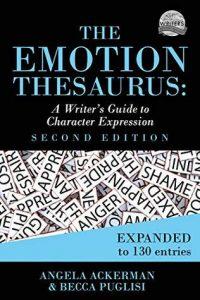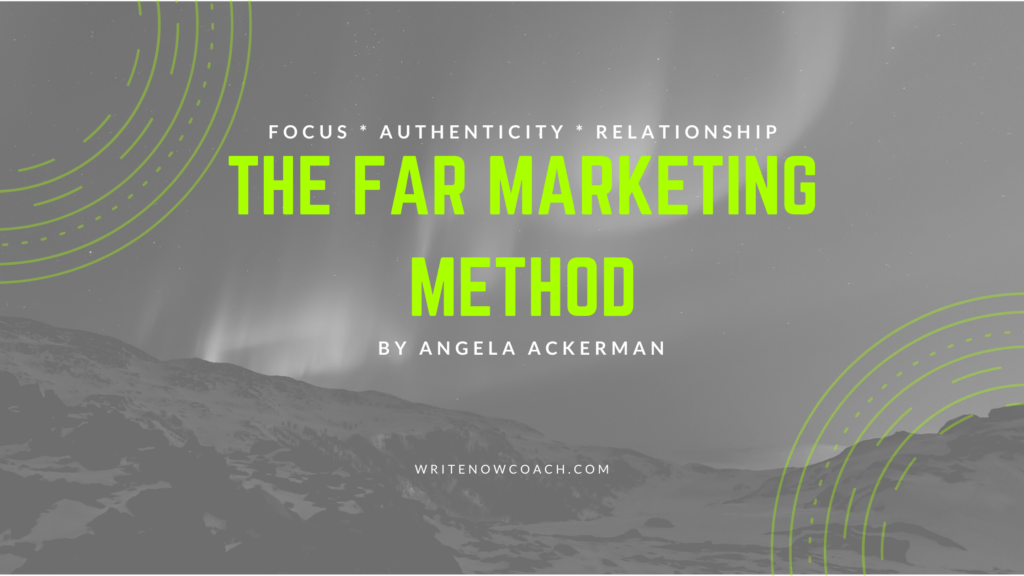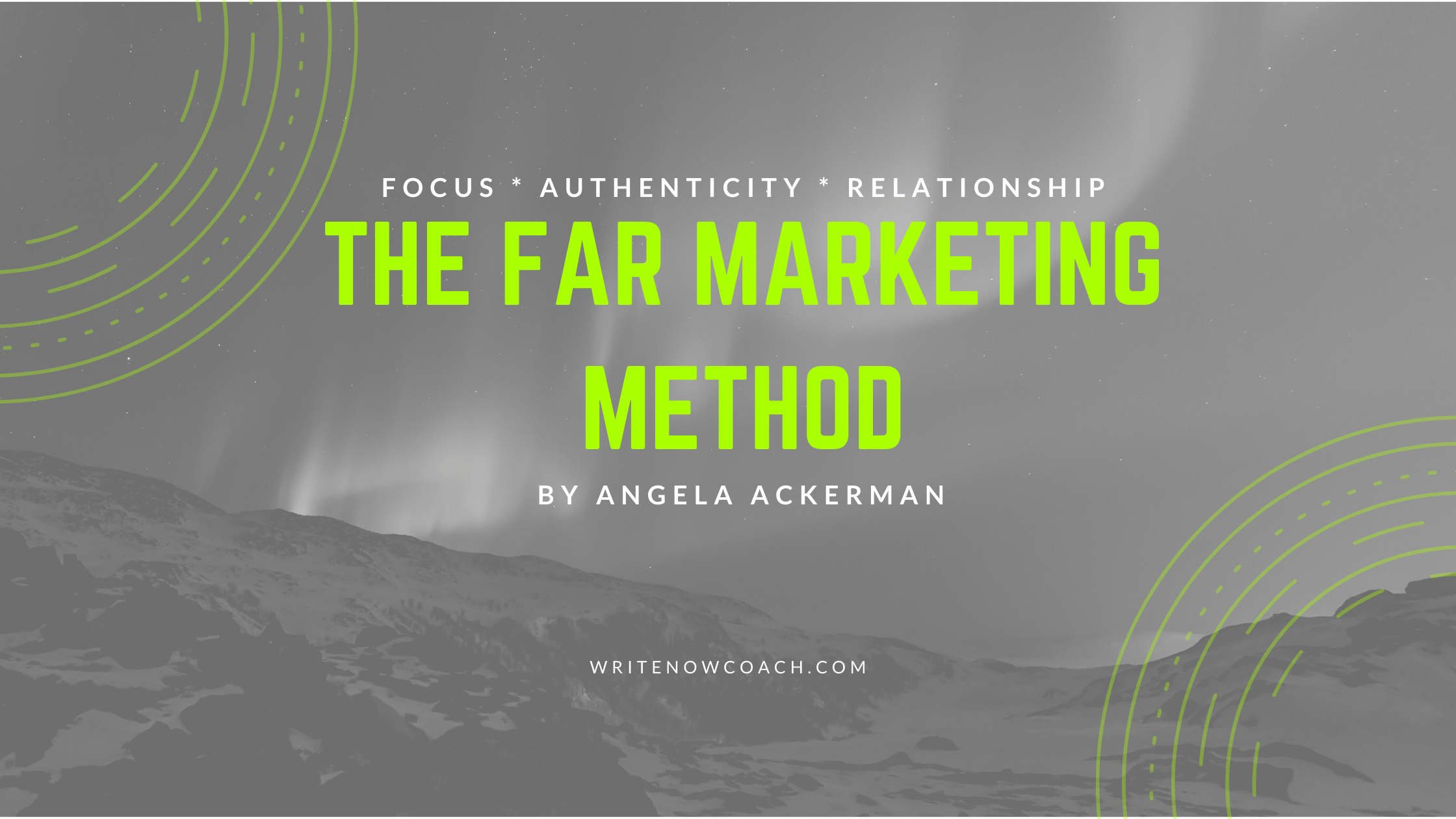The FAR Marketing Method: (Focus, Authenticity, Relationships)
July 14, 2020
Note From Rochelle
Dear Writers,
Every Friday this summer, I’m posting great book recommendations and writing tips from favorite writers on the blog. Check it out!
 Today, I’m delighted to welcome author and entrepreneur Angela Ackerman to the blog to talk about using the FAR Marketing Method for your book. She’s the co-author of The Emotion Thesaurus and its sequels! Enjoy!
Today, I’m delighted to welcome author and entrepreneur Angela Ackerman to the blog to talk about using the FAR Marketing Method for your book. She’s the co-author of The Emotion Thesaurus and its sequels! Enjoy!
Happy writing!
Rochelle

The FAR Marketing Method:
(Focus, Authenticity, Relationships)
As writers we spend an incredible amount of time learning the craft of writing. We read, take workshops, attend conferences, and write, write, write. We focus and revise, draft after draft, pushing ourselves to sharpen our book into the strongest story possible. And then finally, Huzzah! It’s ready. More decisions come along: traditional or self-publish? Once that choice has led to a successful outcome, it’s time to market our beautiful book.
And honestly, this is where many writers stumble because dang it, we’re creatives, not marketers!
Gone are the days where we write and a publisher markets; traditional or self-published, the bulk of the marketing weight will be on us. So this means we must roll up our sleeves (albeit unenthusiastically) and understand this new job on our plate.
And this is where I tell you a secret. Marketing can be a satisfying part of authordom if you do one small thing: flip the script on what you believe marketing to be.
MARKETING IS NOT ABOUT SELLING BOOKS
Okay, some of you are scratching your heads, right? After all, you’ve been taught there’s three pieces to the puzzle: Writing, Publishing, and Marketing. Book sales happen in the Marketing part of the program, so how can it be that marketing doesn’t equal bookselling?
MARKETING IS ABOUT BUILDING RELATIONSHIPS
Some authors do nothing but pitch their books online. I see post after post of “buy my book” promotion. Read this 5-star book review and grab your copy! My book is on sale, so hurry! My book is free for a limited time! Sound familiar? They push book covers and sales-y copy into the social media void, hoping for sales.
Promotion is necessary; it’s how we match people with a product that will help them, or they will enjoy. It’s not a crime to promote. But, done poorly it can do a lot of damage. Splatter promotion (throw it out there to see what sticks) like the above often turns people off because they feel like a dollar sign.
Purposeful and respectful promotion will hit the mark, but only if three vital components of marketing are in place: focus, authenticity, and relationship (FAR).
MARKETING FOCUS
Imagine running into Walmart, buying a fishing rod, a lure, and heading out into the ocean in a rowboat. You are allergic to all but tuna. What do you think the odds are that you will catch a tuna with a generic rod, lure, and no coordinates as to where they might be? Not great, right?
Now imagine you bought a specific rod and bait for tuna, and you asked a salty old fisherman where he goes to catch tuna. Odds are looking good now, right?
It’s the same as a writer trying to find their exact reading audience. If you write cozy mysteries, readers of steampunk, fantasy epics, dystopia, etc. are not your market so promoting to these readers is a waste of time and money. You need to find readers who devour cozy mysteries, and specifically ones who are knitters, like to sew, or make clothes because your cozy mystery takes place during a sewing club’s annual getaway weekend. Knitters and the like will be hardwired to specifically enjoy your book, and promotion is more likely to catch their attention. For more advice on finding your exact reading audience, I recommend this article.
MARKETING AUTHENTICITY:
Another problem we run into is that our potential audience may not know us. If they’ve never read a book of ours or heard of us, how do they know our book is worth risking hard-earned dollars on?
To erase this problem, we need to focus on developing our brand. A brand is the story of who we are, what we value, and the type of unique experience readers will have when they read our books. It requires some soul searching to answer questions like, who am I? What can readers expect from me as a person, author, and creator? What experience can they count on, book after book? Once we define our brand, we must live it, consistently reinforcing it in all we do.
For example, if your brand persona is that of an optimistic author who writes uplifting, funny romances, then this should be central to everything you produce and do. Your romances will have characters that are upbeat, not dark and brooding. Your romance book HEAs will leave readers feeling light and hopeful. On social media, you’ll share information that encourages self-exploration, and positivity, and you’ll blog about finding happiness and how humor is great medicine. You will encourage readers to read other books that are uplifting romances, and your website design, fonts, book covers, taglines, etc. will all reflect your brand. Online and off, you’ll be positive and approachable, not pessimistic and divisive.
Branding should be authentic, not a performance. It should bring out the inner you. The right readers will connect with you, view you as genuine, and find your books a great fit.
MARKETING RELATIONSHIPS:
Okay, you’ve identified who your ideal audience is (focus). You’re confident you know the image you want to present to the world (authenticity). Now it’s time to engage with your potential audience so you can build relationships.
This is the fun part, because it’s literally just you—your authentic self—setting out to find other people who share common ground with your brand and books. You have conversations, share information, support, and explore things together, online and off. And while this might seem intimidating, it’s really not. After all, because the people you will seek out (your potential audience) will have shared interests and passions (that tie to your brand and books), you’ll have lots to say and so will they. It’s all really rather wonderful.
Why do I say marketing is about relationships, not book selling? Because when you build relationships with people, genuine connections form. It’s NOT a transactional exchange. You become invested in each other, enjoying the exchange.
Being open and receptive encourages closeness, and at some point the people you build relationships with will discover you write the type of books they like to read. Think they’ll want to know more? Of course! So in this way you’re adhering to the true purpose of promotion: matching people with something they are interested in. They won’t feel promoted to.
Relationships take time and investment but are such a reward—you are being invited into the lives of your readers. You get to have conversations about your books and about passions you both share. This alone is wonderful, but readers can become your biggest fans and advocates, not only buying books as they come out but encouraging others to give you a try too. When someone feels good because of a relationship and experience you give them, they want the people they care about to feel that wellbeing, too.
Marketing can seem intimidating, but it really isn’t. Be yourself, be genuine and consistent, and engage! You’ll find yourself looking forward to marketing, not dreading it.
Need more help? Here’s 5 Author Tips on Building a Fanbase
 Angela Ackerman is a writing coach, international speaker, and co-author of the bestselling book, The Emotion Thesaurus and its many sequels. Her books are available in eight languages, are sourced by US universities, recommended by agents and editors, and are used by novelists, screenwriters, and psychologists around the world. To date, this book collection has sold over half a million copies.
Angela Ackerman is a writing coach, international speaker, and co-author of the bestselling book, The Emotion Thesaurus and its many sequels. Her books are available in eight languages, are sourced by US universities, recommended by agents and editors, and are used by novelists, screenwriters, and psychologists around the world. To date, this book collection has sold over half a million copies.
Angela is also the co-founder of the popular site Writers Helping Writers, as well as One Stop for Writers, a portal to game-changing tools and resources that enable writers to craft powerful fiction. Her mission is to make writing easier for everyone. Find her on Facebook, Twitter, and Instagram.










But are you saying, if you write dark, angsty, complicated-moral-code stories, that your “authentic” persona/brand should also be dark bad complicated?
Not at all. I would ask you what it is about the books you write that you most identify with, and suggest looking at how those elements fit your brand. If your stories contain characters who are forced into impossible moral situations, then what can you blog about, share, and talk about that reinforces this theme? Do you share a bit about your self and the times when you’ve been forced to make difficult choices? What is the end result for your characters who must make these moral choices? What do they learn? How do they view the world in the aftermath? Are they jaded, or hopeful? The answers to these questions might help you understand why you write these stories, and what your message is about the world, and the way you view it. This will likely be part of your brand.
If you get stuck, or you don’t know where to start, go to Amazon and look up books by authors who write what you write. Visit their social spaces, their website, read their book blurbs, and look for patterns that emerge. What do they talk about online? How do they engage with their readers? What content do they post is on brand and resonates most with the people who follow them? What do they write about in their newsletters?
I hope this helps a bit, Donna!